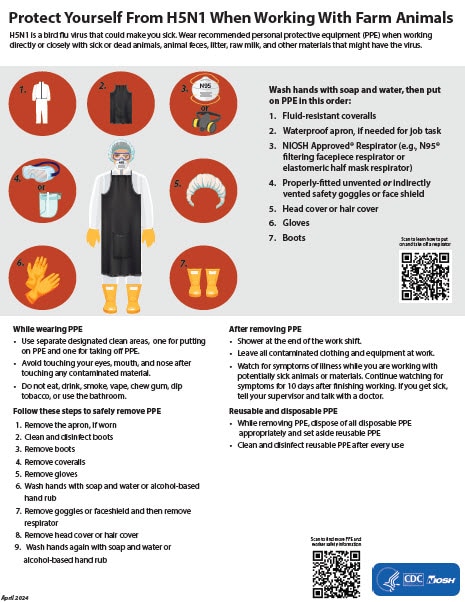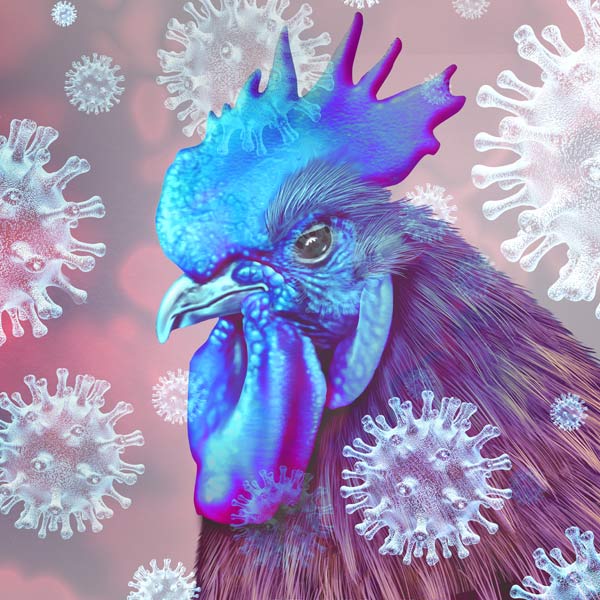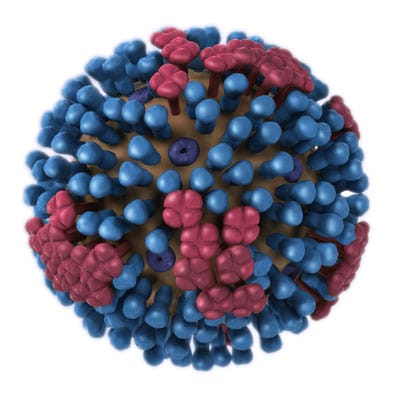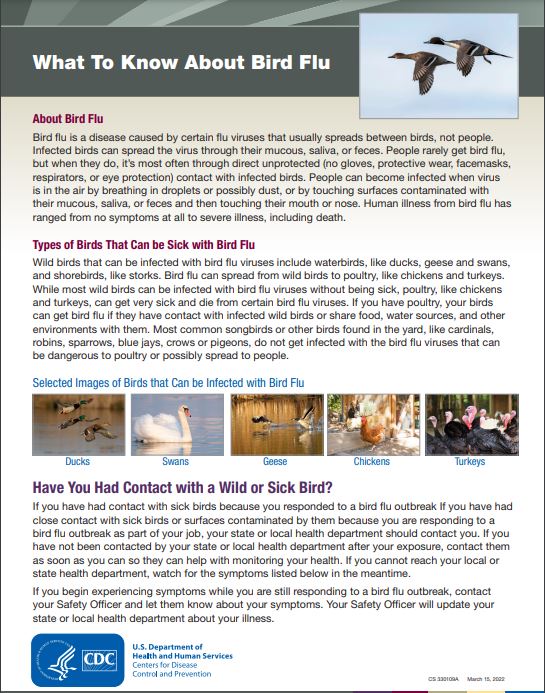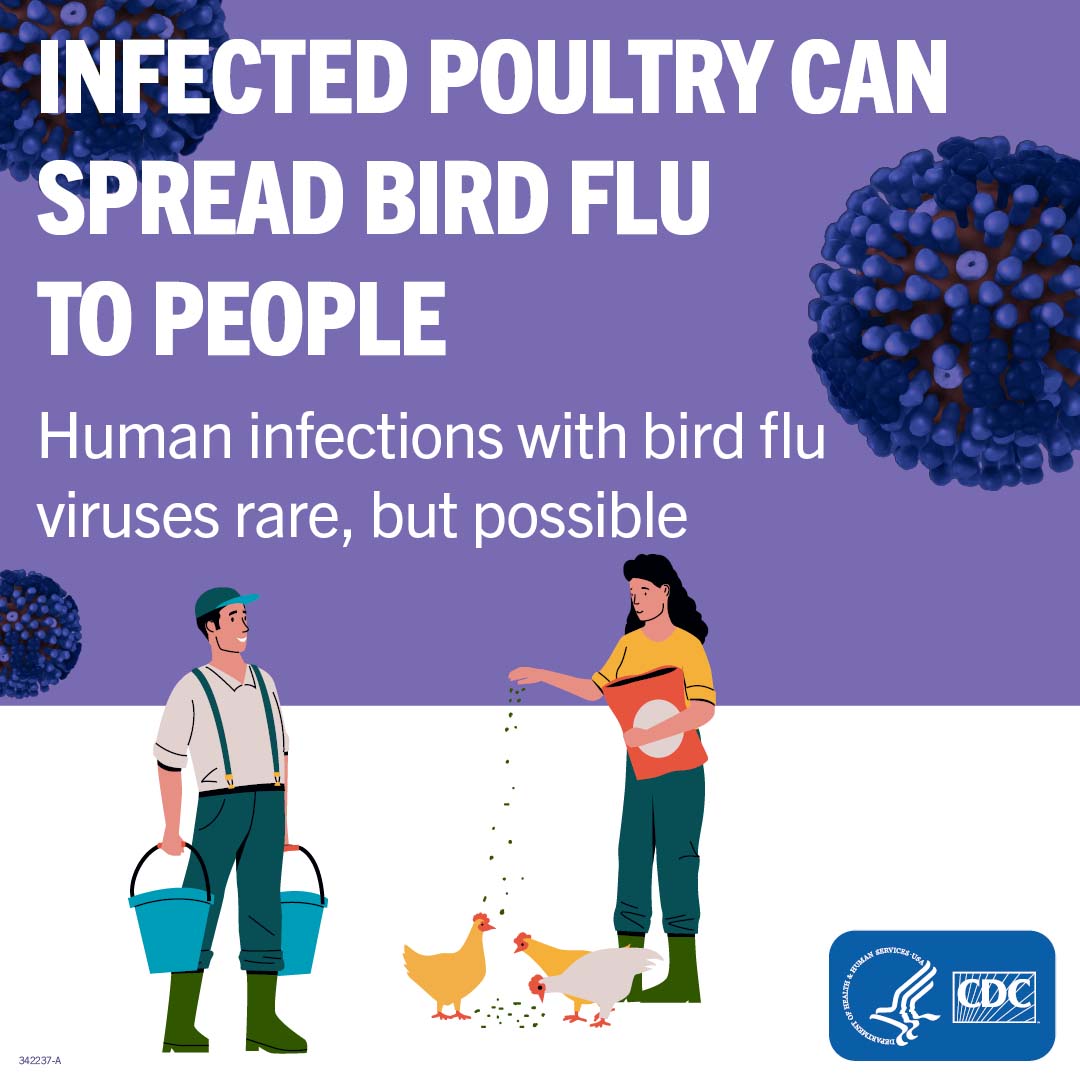Prevention and Antiviral Treatment of Bird Flu Viruses in People

CDC considers the current risk to the general public from the H5N1 bird flu outbreak in wild birds, poultry, cattle, and other animals to be low. For information on the most recent bird flu developments specific to the United States, please visit the Current Situation Summary page.
- Protective actions around birds and other animals
- The best prevention is to avoid sources of exposure
- Protective actions for people who have contact with birds or other animals infected with bird flu because of their job
- Information for other groups who have contact with birds or other animals infected with bird flu viruses
- Hunters
- Bird owners and People who have Backyard or Hobbyist Flocks
- If you’ve had direct contact with birds or other animals infected with bird flu virus and become sick
- Vaccination reduces the potential for coinfection with seasonal flu and bird flu
- What to do if you find a sick or dead animal
- Preparing and consuming food
- Traveling to other countries
- Antiviral Drugs Can Be Used to Treat Illness
- The U.S. Government is Developing A(H5N1) Bird Flu Vaccines in Case they are Needed
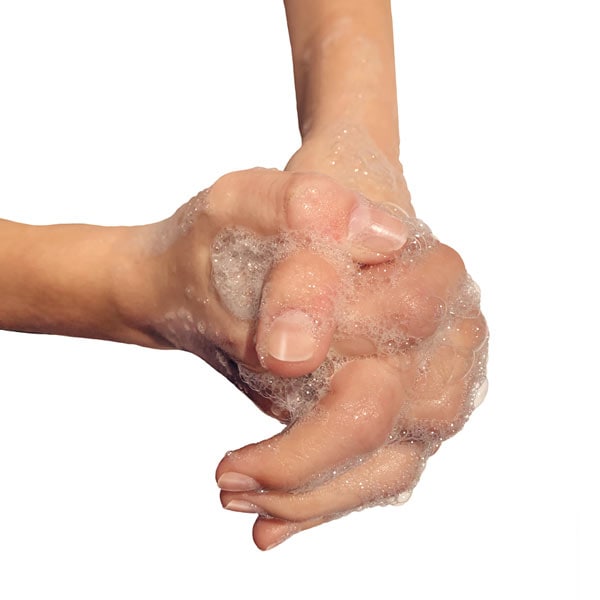
Avoid or minimize contact with wild birds or sick or dead poultry infected with bird flu viruses or other infected or potentially infected animals by wearing gloves and washing your hands with soap and water after touching them. Wear respiratory protection, such as an N95 respirator if available or, if not available, a well-fitting facemask (e.g., a surgical mask).
Protective actions around birds and other animals
- As a general precaution, whenever possible people should avoid direct contact with wild birds and other animals infected with or suspected to be infected with bird flu viruses and observe them only from a distance, if possible.
- Wild birds can be infected with avian (bird) influenza (flu) A viruses even if they don’t look sick.
- Avoid unprotected contact with domestic birds (poultry) or other animals that may be sick or have died or are suspected or known to have bird flu virus infection.
- Do not touch surfaces that may be contaminated with saliva, mucous, animal feces, raw milk, animal litter (bedding material), or materials contaminated by wild or domestic birds or other animals with confirmed or suspected bird flu virus infection.
The best prevention is to avoid sources of exposure
The best way to prevent bird flu is to avoid sources of exposure whenever possible. Infected birds shed avian influenza viruses in their saliva, mucous, and feces and other infected animals may shed bird flu viruses in respiratory secretions and other body fluids (e.g., cow milk). Influenza A viruses also can infect the respiratory tract of mammals and cause infection in other organ tissues. People rarely get bird flu virus infection; however, human infections with avian influenza viruses can happen when enough virus gets into a person’s eyes, nose or mouth, or is inhaled. This can happen when virus is in the air (in droplets or possibly dust) and a person breathes it in, or when a person touches something that has virus on it and then touches their mouth, eyes or nose. Bird flu virus infections in people happen most often after close, prolonged and unprotected (no gloves or other protective wear) contact with infected birds or other animals. People with close or prolonged contact with infected birds or animals or their contaminated environments are at greater risk of infection.
Protective actions for people who come into contact with birds or other animals infected with or potentially infected with avian influenza viruses because of their job
People who have job-related contact with infected or potentially infected birds or other animals should be aware of the risk of exposure to avian influenza viruses and should take proper precautions. Groups of people who may have occupational exposure to infected birds include people who work at bird rehabilitation centers, people who work at bird and other animal sanctuaries, poultry farm or dairy farm workers, people who raise backyard bird flocks, and responders to bird flu outbreaks in birds or other animals. If you must handle infected or potentially infected birds or other animals because of your job, take the following precautions:
- Use protective equipment like gloves, an N95 respirator if available or, if not available, a well-fitting facemask (e.g., a surgical mask), and eye protection (e.g., goggles).
- Wash your hands with soap and water after touching birds.
- Avoid touching your mouth, nose, or eyes after contact with birds or surfaces and materials that may be contaminated with saliva, mucous, or feces from wild or domestic birds.
- Change your clothes before contact with healthy domestic poultry and after handling infected or potentially infected birds and other animals with confirmed or suspected bird flu virus infection. Then, throw away the gloves and facemask, and wash your hands with soap and water.
- CDC has more information available on what to do after you have been exposed to infected poultry or other birds.
Information for other groups who have contact with infected birds or other animals
Other groups of people who may have contact with birds or other animals infected or potentially infected bird flu viruses include hunters and people who have backyard or hobbyist flocks. People should report sick birds or other animals or unusual bird or other animal deaths to the state or the federal government, either through their state veterinarian or by calling USDA’s toll-free number at 1-866-536-7593. Find additional information on biosecurity for backyard flocks on USDA’s APHIS website.
Information for Hunters
Hunters who handle wild birds should dress game birds in the field when possible and practice good hygiene to prevent any potential disease spread. If possible, wear gloves, an N95 respirator if available or, if not available, a well-fitting facemask (e.g., a surgical mask), and eye protection when dressing birds. Afterwards, throw away the gloves and facemask and then wash your hands with soap and water. More information on general safety guidelines for hunters handling wildlife and their tissues is available from the U.S. Fish & Wildlife Service’s website.
Bird Owners and People who have Backyard or Hobbyist Flocks
Bird owners should practice good biosecurity and prevent contact between their birds and wild birds. Bird owners should follow the protective actions around birds listed at the top of this page. If you must handle sick birds, take the following precautions:
- Use protective equipment like gloves, an N95 respirator if available or, if not available, a well-fitting facemask (e.g., a surgical mask), and eye protection (e.g., goggles),
- Wash your hands with soap and water after touching birds,
- Avoid touching your mouth, nose, or eyes after contact with birds or surfaces and materials that may be contaminated with saliva, mucous, or feces from wild or domestic birds.
- Change your clothes before contact with healthy domestic poultry and handling wild birds, captive wild birds, farmed birds, and other pet birds. Then, throw away the gloves and facemask, and wash your hands with soap and water.
- CDC has more information available on what to do after you have been exposed to infected poultry or other birds.
Specific recommendations regarding the appropriate personal protective equipment (PPE) to wear and how to safely put it on and take it off are available at Backyard Flock Owners: Take Steps to Protect Yourself from Avian Influenza (Bird Flu).
If you’ve had direct contact with birds or other animals infected with bird flu virus and become sick
CDC has information available [256 KB, 2 pages] for different groups of people who become sick after contact with infected birds.
People who become sick within 10 days of their exposure to infected or potentially infected birds or other animals should isolate at home away from their household members and should not go to work or school until they are proven not to have bird flu virus infection. The local or state public health department should be notified and can assist in monitoring and advising when isolation is no longer required.
Close contacts (e.g., family members) of people who have been exposed to bird flu viruses should monitor their health and report to their health care provider any new symptoms, especially respiratory symptoms or eye redness or conjunctivitis, within 10 days of the last exposure.
For more information about bird flu and what to do if you have been exposed to bird flu, visit: What To Know About Bird Flu (cdc.gov) [154 KB, 2 Pages]
Seasonal influenza vaccination reduces the potential for coinfection with seasonal flu and bird flu
It is especially important that people who may have exposure to infected or potentially infected birds or other animals get a seasonal flu vaccine, ideally 2 weeks before their potential exposure, if possible. Seasonal flu vaccination will not prevent infection with avian influenza viruses but can reduce the risk of getting sick with human and bird flu viruses at the same time.
What to do if you find an infected or potentially infected or dead wild bird or other animal
State and local governments have different policies for collecting dead and testing sick or dead animals, so check with your state health department, state veterinary diagnostic laboratory, or state wildlife agency for information about reporting animals that look sick or are dead in your area.
People should avoid unprotected (not using respiratory and eye protection) exposures to sick or dead animals including wild birds, poultry, other domesticated birds, and other wild or domesticated animals. Wildlife agencies regularly investigate reports of sick or dead animals. This type of reporting could help with the early detection of illnesses like West Nile virus or bird flu. If local authorities tell you to throw away the bird’s carcass (body), don’t touch it with your bare hands. Use gloves or a plastic bag turned inside out to place the body in a garbage bag, which can then be thrown away in your regular trash. To report unusual signs in birds or other animals you have seen in the wild, call 1-866-536-7593.

It is safe to eat foods that are properly handled and cooked.
Preparing and consuming food
For poultry:
- Cooking poultry and eggs to an internal temperature of 165˚F kills bacteria and viruses, including bird flu viruses. People should separate uncooked (raw) poultry from cooked foods and foods that won’t be cooked. Cook all poultry and poultry products (including eggs) all the way before eating. More information about safe handling and cooking of poultry can be found here: Chicken and Food Poisoning | CDC
For beef:
- Cooking beef to the appropriate internal temperature kills bacteria and viruses, including avian influenza viruses. Cook all beef products thoroughly before eating. Refer to this list of safe minimum internal temperatures for different cuts of beef. Separate uncooked (raw) beef from cooked foods or foods that won’t be cooked to prevent cross-contamination.
Eating uncooked or undercooked poultry or beef can make you sick. In addition, people should not eat or drink raw milk or products made with raw milk. More information is available at How to Prevent Food Poisoning.
While there is no evidence that anyone in the United States has gotten bird flu after eating properly handled and cooked poultry products, uncooked poultry and poultry products (like blood) could have been the source of a small number of bird flu virus infections in people in Southeast Asia. Visit CDC’s Chicken and Food Poisoning web page for instructions on handling poultry safely.
Traveling to other countries
Currently, CDC does not recommend against travel to any countries due to bird flu viruses in wild birds, poultry, other animals, or people. CDC recommends that travelers to countries and states with bird flu outbreaks in poultry or people:
- Do not visit poultry farms, bird markets, or other places where live poultry are raised, kept, or sold, if possible. If you must visit such places, wear a well-fitting facemask and avoid touching poultry or other birds.
- Do not eat raw or undercooked poultry products and wash your hands after touching uncooked poultry.
- Practice good hygiene.
- Visit a doctor if you become sick during or after travel. Tell the doctor that you might have been exposed to infected birds.
Visit CDC Travelers’ Health for more information on avian influenza.
Antiviral Drugs Can Be Used to Treat and Prevent Illness
CDC currently recommends treatment as soon as possible with flu antiviral drugs for people with suspected or confirmed influenza A(H5N1) virus infection. Antiviral treatment works best when started as soon as symptoms begin. If you get sick after being in close contact with infected or potentially infected birds or other animals, contact your state or local health department and a health care provider right away. They may have you get tested for bird flu and a health care provider may write you a prescription for an antiviral drug to treat your illness. It’s important to take the medication as directed.
Available data on avian influenza viruses spreading worldwide suggest that bird flu virus infections can be treated with current flu antiviral drugs. Antiviral treatment works best when treatment is started early after symptoms begin. When influenza viruses evolve in ways that make antiviral treatment less effective, this is called antiviral resistance. CDC regularly tests bird flu viruses for antiviral resistance.
Antivirals may also be given soon after unprotected exposure (not using respiratory and eye protection) to a sick person with confirmed with A(H5N1) virus infection or after unprotected exposure to sick or dead poultry or other infected animals to prevent infection and illness.
The U.S. Government is Developing A(H5N1) Bird Flu Vaccines in Case they are Needed
Seasonal flu vaccines do not provide protection against these viruses. CDC has developed H5 that are nearly identical or, in many cases, identical to the hemagglutinin (HA) protein of recently detected clade 2.3.4.4b A(H5N1) viruses in humans, birds and other mammals. This H5 CVV could be used to produce a vaccine for people, if needed, and preliminary analysis that it is expected to provide good protection against the currently circulating H5N1 influenza viruses in birds and other animals. More information about Making a candidate Vaccine Virus (CVV) for a Highly Pathogenic Avian Influenza (Bird Flu) Virus is available.
If you’re a clinician, laboratorian, or public health worker, visit
Avian Influenza: Information for Health Professionals and Laboratorians for the latest guidance.
